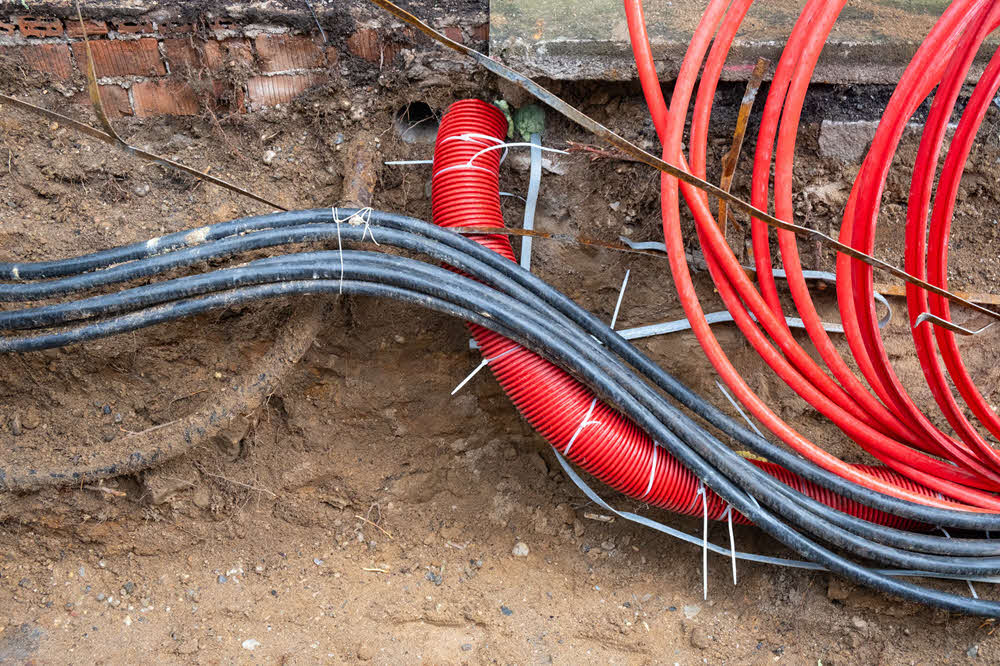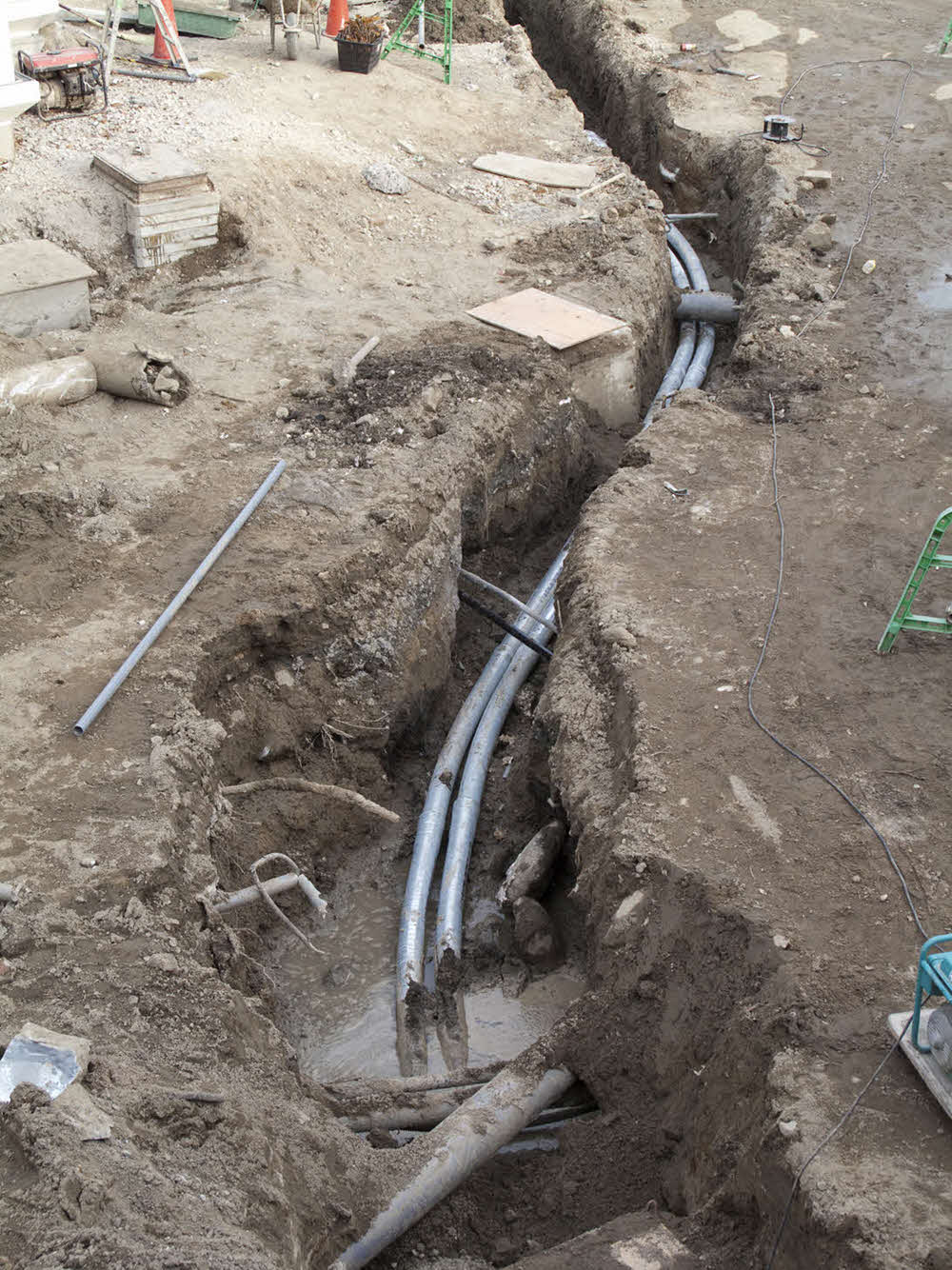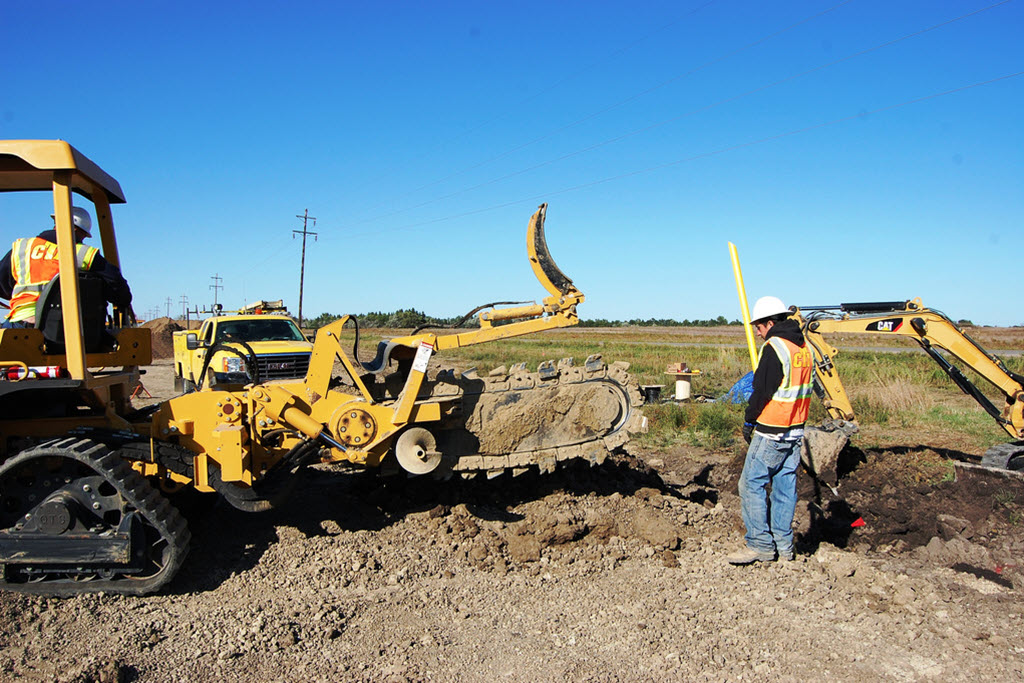Electrical Conduit Servicesin Auburn Hills MI
Expert Conduit Installation to Support Electrical and Data Systems
We Are Locally Owned & Operated For Over 37 Years
Contact Us Today!
We Serve Businesses In And Around The Following Cities:
About Electrical Conduit Services
Introduction: Conduit for Electrical Underground in Commercial Properties
The modern urban landscape of Auburn Hills is underpinned by a hidden network of vital building systems. Among these essential infrastructures is the conduit for electrical underground. This sleek, subterranean marvel guarantees that commercial properties can tap into uninterrupted power sources, driving productivity, ensuring safety, and fueling growth.
The dynamic way our city landscapes function indicates the revolution brought about by modern technological advancements like underground electrical conduit systems. The broad concept of such systems isn’t merely about digging a hole and running wires through; it involves a complex process that is careful, calculated, precise, and highly regulated.
Understanding Underground Electrical Conduit: An Unseen Powerhouse
Underground electrical conduit acts as a lifeline for commercial properties. Its role is simple but critical: protect electrical wiring from damage, harsh weather conditions, and possible interference, ensuring seamless operations. This conduit is typically made of durable materials such as PVC, a popular choice for running an underground electric line due to its cost-effectiveness, flexibility, and resistance to corrosion.
The PVC conduit installation underground is a meticulous process, a synergy between precise trenching for electrical conduit and careful insertion of the conduit itself. In the city of Auburn Hills, a company like D&J Contracting is trusted with the process, leveraging years of professional experience to provide proficient installation services.
Process of Underground Conduit Installation
Implementing an undergound electrical conduit system is a multi-stage process that begins with a study of property layout and ends with careful backfilling. The process involves digging a trench electrical line – a task that requires excessive precision to not interfere with other underground utilities or breaching city rules.
Once the trench is ready, the next step is the installation of PVC conduit for underground wiring. Following strict safety regulations and utilizing professional methods, D&J Contracting ensures the integrity of the conduit underground electrical network, preventing potential safety risks or operational disruptions.
The final stage in this process is running the electrical wire through the now-ready conduit. Each wire is meticulously installed and connected to ensure uninterrupted power supply to the intended commercial property.
The Benefits of Underground Electrical Conduit
Choosing the right conduit for electrical underground provides a host of benefits for commercial properties in Auburn Hills. Predominantly, the most significant benefit is the safety that such a system offers. By encasing every electrical wire in a protective conduit, the risks associated with fire, short circuits, and other potential accidents are efficiently mitigated.
Furthermore, these systems greatly enhance the aesthetic appeal of commercial properties by keeping wires out of sight. They also allow for future expansions, as additional or upgraded wires can be added without having to disrupt operations.
On another note, businesses benefit from reduced maintenance costs. Durable materials like PVC have longevity, reducing the need for frequent replacements. Plus, underground electrical conduit systems are often shielded from the harsh effects of weather, simultaneously increasing their lifespan and dependability.
Firms like D&J Contracting excel in offering services associated with installing PVC conduit underground. With their skilled workforce and high-standard equipment, your commercial property stands to gain significantly, ensuring seamless running of underground electric line for current needs and future expansion.
The Impact of Underground Electrical Conduit in Auburn Hills
In a bustling city like Auburn Hills where commercial growth is significant, underground electrical conduit systems play a significant role. They’ve become a cornerstone in the development of modern properties, fueling businesses with dependable power sources, and facilitating growth and profitability.
Local companies like D&J Contracting, a trusted provider for underground conduit installation, have been instrumental in this transformation. Their work, ensuring seamless conduit underground electrical installations, has powered countless properties – from retail structures to industrial complexes, and more.
The value of an integrated underground electrical conduit network cannot be understated. It promotes safety, efficiency, and the seamless functionality commercial properties depend upon for success.
Final Thoughts: Elevate Your Commercial Property with Underground Electrical Conduit
About running electric line underground, it’s a necessity, not a luxury. It’s about safeguarding your property, into protecting your investment, and about enlisting expert assistance to ensure that your power infrastructure is solid, safe, and designed to sustain growth.
D&J Contracting is your trusted companion on this journey – a conduit to realizing your vision. The team’s unmatched skill and dedication to running electrical wire underground ensure the kind of reliability and peace of mind Auburn Hills’ businesses need to survive and thrive.
As a stakeholder in the commercial landscape of Auburn Hills, you have every reason to pursue the best with robust, reliable, and aesthetically pleasing underground electrical conduit systems. Remember, a power connection is our connection to tomorrow’s growth. Secure yours today.
Electrical Conduit Services Gallery


Call Us Today to receive your Free Quote for
Conduit For Electrical Underground in Auburn Hills
Serving: Auburn Hills, Michigan

About Auburn Hills, Michigan
In 1908, automobile pioneer John Dodge bought a farmhouse 3 miles (4.8 km) northeast of Auburn Heights to use as his country retreat. His oldest child, Winifred Dodge, married real estate baron Wesson Seyburn, who built his own country retreat 2.5 miles (4.0 km) north of Auburn Heights. The estate included hunting land, dog kennels, a swimming pool, horse stables, and a 5,000-square-foot (460 m) Colonial Revival house. Pontiac Township purchased the estate in 1976, and adapted the buildings for government use. Today, it is known as the Auburn Hills Civic Center.
The first use of the name “Auburn Hills,” in 1964, was by Oakland Community College. They named their campus (a former Nike missile base) at Featherstone and Squirrel roads for the town and the hilly terrain in the area. Besides Oakland Community College, three other colleges, Oakland University, Baker College, and Western Michigan University Thomas M. Cooley Law School have campuses partially within the city limits.
Auburn Hills began as Pontiac Township, including the village of Auburn, in 1821, at what is today the corner of Auburn and Squirrel roads. Situated on the Clinton River, it was named by Aaron Webster, the first settler, for Auburn, New York. His sawmill and grist mill attracted settlers to Auburn. After the streets were laid out in 1826, Auburn rivaled nearby Pontiac until the 1860s, when it lost its own prosperity. The town was renamed Amy in 1880, and it officially became Auburn Heights in 1919. Pontiac Township bordered the city of Pontiac on two sides. The township attempted to incorporate as Pontiac Heights in 1971, but was denied by state officials. Pontiac Township became a charter township in 1978, to protect itself from further annexation. In 1983, Pontiac Township merged with the village of Auburn Heights to become the City of Auburn Hills. It is not to be confused with the similarly named city of Auburn, Michigan, that exists in Bay County, near Saginaw Bay.
According to the United States Census Bureau, the city has a total area of 16.64 square miles (43.10 km), of which 16.60 square miles (42.99 km) is land and 0.04 square miles (0.10 km) (0.24%) is water.
| Census | Pop. | Note | %± |
|---|---|---|---|
| 1880 | 111 | — | |
| 1990 | 17,076 | — | |
| 2000 | 19,837 | 16.2% | |
| 2010 | 21,412 | 7.9% | |
| 2020 | 24,360 | 13.8% | |
| U.S. Decennial Census | |||
As of the census of 2010, there were 21,412 people, 8,844 households, and 4,923 families living in the city. The population density was 1,289.9 inhabitants per square mile (498.0/km). There were 9,965 housing units at an average density of 600.3 per square mile (231.8/km). The racial makeup of the city was 66.3% White, 18.5% African American, 0.3% Native American, 8.9% Asian, 2.7% from other races, and 3.4% from two or more races. Hispanic or Latino of any race were 7.8% of the population.
There were 8,844 households, of which 27.0% had children under the age of 18 living with them, 38.8% were married couples living together, 12.4% had a female householder with no husband present, 4.5% had a male householder with no wife present, and 44.3% were non-families. 33.5% of all households were made up of individuals, and 7.3% had someone living alone who was 65 years of age or older. The average household size was 2.24 and the average family size was 2.90.
The median age in the city was 31.4 years. 19.4% of residents were under the age of 18; 17.8% were between the ages of 18 and 24; 31.9% were from 25 to 44; 21.6% were from 45 to 64; and 9.4% were 65 years of age or older. The gender makeup of the city was 48.4% female and 51.6% male.
As of the census of 2000, there were 19,837 people, 8,064 households, and 4,604 families living in the city. The population density was 1,194.5 inhabitants per square mile (461.2/km). There were 8,822 housing units at an average density of 531.2 per square mile (205.1/km). The racial makeup of the city was 75.92% White, 13.22% African American, 0.32% Native American, 6.33% Asian, 0.04% Pacific Islander, 1.56% from other races, and 2.61% from two or more races. Hispanic or Latino of any race were 4.50% of the population.
There were 8,064 households, out of which 26.7% had children under the age of 18 living with them; 43.0% were married couples living together; 10.5% had a female householder with no husband present and 42.9% were non-families. 33.1% of all households were made up of individuals, and 6.0% had someone living alone who was 65 years of age or older. The average household size was 2.25 and the average family size was 2.92.
The age distribution is 20.4% under the age of 18, 15.9% from 18 to 24, 38.1% from 25 to 44, 18.2% from 45 to 64, and 7.3% who were 65 years of age or older. The median age was 31 years. For every 100 females, there were 98.3 males. For every 100 females age 18 and over, there were 97.5 males.
The median income for a household in the city was $51,376, and the median income for a family was $60,849. Males had a median income of $45,686 versus $34,015 for females. The per capita income for the city was $25,529. About 3.9% of families and 6.3% of the population were below the poverty line, including 6.4% of those under age 18 and 4.4% of those age 66 or over.
School districts serving sections of Auburn Hills include Avondale School District, Pontiac School District, and Rochester Community Schools.
The Avondale School District operates two elementary schools in the city limits: R. Grant Graham Elementary School and Auburn Elementary School. Portions of Auburn Hills in ASD are zoned to these schools. All ASD residents are zoned to Avondale Middle School in Rochester Hills and Avondale High School in Auburn Hills. Other ASD facilities in Auburn Hills include the district administrative offices and Avondale Montessori. A Pontiac school district school, Will Rogers Elementary School, is located in northeastern Auburn Hills.
Private schools in Auburn Hills include:
- Auburn Hills Christian School
- Oakland Christian School
Private schools near Auburn Hills:
- Notre Dame Preparatory/Marist Academy, Pontiac
- Holy Family Regional School (HFRS) – Consists of a grade PK-3 North Campus in Rochester and a 4-8 South Campus in Rochester Hills. Two churches in Auburn Hills designate HFRS as the parish school: St. John Fisher Chapel and Sacred Heart of the Hills. The first two sponsored the school from the beginning and the other three joined later, with Sacred Heart being the final one.
The main campus of Oakland University sits within Auburn Hills. Oakland Community College, Baker College, and Western Michigan University Thomas M. Cooley Law School are also situated in Auburn Hills.
Call Us Today to receive your Free Quote for
Conduit For Electrical Underground in Auburn Hills
Related Services in Auburn Hills, Michigan
We Serve Businesses In The Following Zip Codes:
48007, 48015, 48021, 48026, 48035, 48036, 48038, 48042, 48043, 48044, 48045, 48046, 48047, 48048, 48050, 48051, 48066, 48071, 48080, 48081, 48082, 48083, 48084, 48085, 48088, 48089, 48090, 48091, 48092, 48093, 48098, 48099, 48225, 48230, 48236, 48310, 48311, 48312, 48313, 48314, 48315, 48316, 48317, 48318, 48397